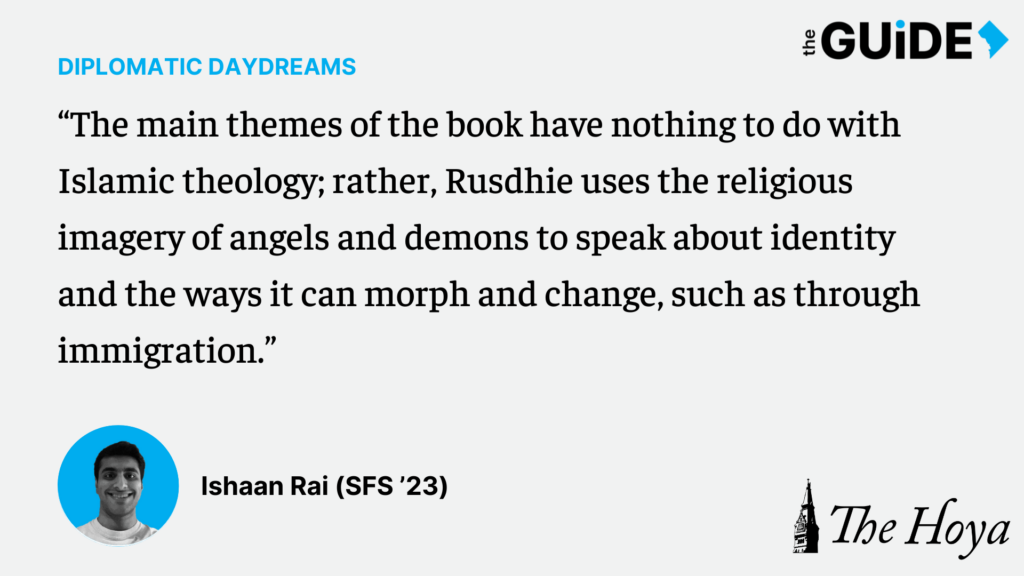“The Satanic Verses,” the 1988 novel by Indian-born British writer Salman Rushdie, may be the most controversial book of the modern era. More than 30 years later, the frightening reaction to this piece of fantastical fiction represents the free speech debate and today’s cancel culture.
Upon its release, the book was met with a torrent of outrage from the Muslim world and from Muslims in the West who claimed Rushdie — who was raised Muslim but later became an atheist — had offended Islam in the book and committed blasphemy because of his retelling of the life of Muhammad. The Supreme Leader of Iran Ruhollah Khomeini even issued a fatwa, a legal opinion on a point of Islamic law, calling for Rushdie’s death, leading to scores of assassination attempts against him and the murder of the novel’s Japanese translator, Hitoshi Igarashi.
The absurd overreactions during the so-called Rushdie Affair, which were largely disconnected from the themes of what he actually wrote, perfectly encapsulate the pitfalls of limiting speech, especially the written word. Rushdie himself signed a letter in Harper’s Magazine last year, titled “A Letter on Justice and Open Debate,” which denounces what it deems the growing intolerance and censorship in the media and academic spaces.
The novel itself falls into Rushdie’s favored genre of magical realism, taking place in the real world with elements of the fantastic and supernatural. The book tells the story of two Indian Muslims and their miraculous brush with death: Gibreel Farishta, a Bollywood actor searching desperately for love in England, and Saladin Chamcha, a voice actor who moved to London in his youth and now feels torn between his new home and his motherland of India.
The novel opens with Gibreel and Saladin sitting next to each other on a flight from Mumbai to London when the plane is hijacked by Sikh terrorists and blown up mid-air. As the two plummet through the air, Gibreel apparently sprouts angel wings and flies himself and Saladin safely to the England shore. After their “rebirth,” the two come into conflict as they adventure through England, with Gibreel gradually taking on more angelic characteristics while Saladin gains devilish ones, transforming into a goat-legged demon. However, all along it remains unclear whether any of the magic is actually occurring or if the incidents are simply the delusions of the two protagonists.
Rushdie’s wordplay is brilliant and at times difficult to parse, especially for those unfamiliar with Indian culture or Islam. Rushdie intersperses his prose with Hindi, Arabic and even the occasional Latin, twisting together and pulling apart words to give his lines a sense of poetry and rhythm.
The controversy begins when, at certain points in the book, Gibreel has visions in which he imagines himself as the archangel Gabriel, through whom he is able to witness the Prophet Muhammad’s life. Three dream sequences, encompassing a subversive retelling of Muhammad’s experiences in Mecca and Medina, contain numerous scenes that infuriated conservative Muslims.
Truthfully, these dream sequences are not the main point of the book and are largely subplots meant to strengthen Gibreel’s character arc and Rushdie’s few biting criticisms of Islam. The main themes of the book have nothing to do with Islamic theology; rather, Rusdhie uses the religious imagery of angels and demons to speak about identity and the ways it can morph and change, such as through immigration.
For instance, Saladin, who is often interpreted as a stand-in for Rusdhie himself, spurned Indian culture as a teenager and attempted to become a true Londoner. However, Saladin’s transformation into a devil is a sign that, no matter how hard he tries, he will always be othered in British society.
In the end, Saladin chooses to stay in India, letting go of his envy and embracing his second chance at life. The critics of “The Satanic Verses” missed these themes, rather focusing on Rushdie’s minimal satire of Islam through magical realism and the fantasy genre. As Rushdie himself said, “The book isn’t actually about Islam, but about migration, metamorphosis, divided selves, love, death, London and Bombay.”
Ultimately, the defenders of Rushdie largely won out, as his critics failed to get the book banned in the West. The controversy of “The Satanic Verses” remains a cautionary tale against the suppression of objectionable content and cancel culture, and it warns readers to see works of fantasy and magical realism as what they are: fiction.














